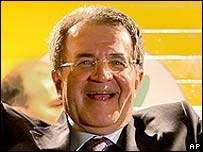Untitled Document
 |
|
Romano Prodi insists he can lead a strong government
|
Italy's centre-left opposition leader Romano Prodi has been declared
official winner of the parliamentary election after an extremely close race.
But his rival, centre-right PM Silvio Berlusconi, refused to admit
defeat, saying there had been irregularities.
Official results showed Mr Prodi had won just enough seats to control the Senate
(upper house) after having already won a lower house majority.
He rejected Mr Berlusconi's suggestion of forming a grand coalition.
The count gave Mr Prodi 158 Senate seats, against 156 for Mr Berlusconi.
The final results came after a nail-biting night of conflicting forecasts,
based on exit polls and partial counts, which variously put the coalitions of
Mr Prodi and his rival ahead.
No deal
Mr Berlusconi, who won two previous elections, suggested forming a grand coalition
spanning both camps, like that in Germany.
"Anyone with good sense should consider a government... which contains the
representatives of all the Italians," he told reporters.
A spokesman for Mr Prodi said the centre-left planned to govern with the coalition
it had put to the voters and rejected the idea of a grand coalition "absolutely".
Mr Berlusconi, a billionaire media magnate, also said it was too early for
anyone to claim outright victory.
He insisted the voting figures showed "many, many, many murky aspects"
and needed to be checked - especially the votes cast by expatriate Italians.
Prodi confident
The coalition led by Mr Prodi - a former prime minister and former president
of the European Commission - is thought to have won the vote in the lower house
by just 25,000 votes.
But changes to the electoral system meant whoever won the lower house would automatically
get a working majority there, even if the margin was small.
The Senate result hinged on the results for six seats allocated to representatives
of expatriate Italians.
An aide to Mr Berlusconi demanded a "scrupulous" investigation into
why an estimated 500,000 ballots were annulled.
Italians awoke on Tuesday to newspaper headlines declaring that the election
had split the country in two.
Mr Prodi said he would have the authority to lead the country for five years
despite the apparent narrow margin of victory, vowing to "wake up Italy".
"We want peace, we want unity, we want economic recovery and harmony,"
he told a news conference.
Hard task
Despite Mr Prodi's majority in both houses of parliament, his razor-thin majority
in the Senate will make it difficult to govern the country.
Milan's stock exchange opened 1% down on Tuesday amid concerns over political
deadlock.
Italy's economy has remained sluggish for much of Mr Berlusconi's tenure, and
the country has substantial foreign debts.
Financial markets seem braced for a period of political paralysis in which
little is done to tackle Italy's urgent economic problems, BBC business reporter
Mark Gregory says.
A fragile incoming centre-left government with the narrowest of majorities
and potentially deep splits between coalition partners is seen as unlikely to
grasp the nettle of painful economic reform, he says.
Our reporter adds there are also question marks over how specific election
promises will be funded, especially Mr Prodi's plan to boost industry by reducing
employers' contributions towards workers' social benefits by 5%.

